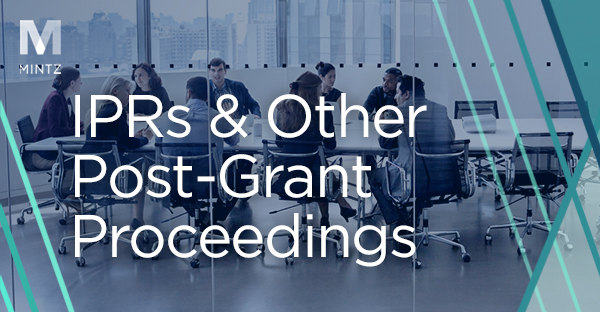Tip #1 for Avoiding IPR Institution: Litigation Venue Selection
Venue selection is a critical component to any patent enforcement strategy, even before the inception of the PTAB as we know it today. Venue now has even greater importance, as the speed of your patent case (i.e. time to trial) and stay statistics will have a direct impact on whether IPRs against your patents will institute in light of the Fintiv factors. Because venue selection is largely within the patent owner’s control, a successful enforcement strategy should factor the likelihood that the chosen venue may assist in avoiding IPR institution, in addition to other factors. Using this built-in advantage may be critical to your case proceeding in district court, rather than being diverted to (and potentially dying in) the PTAB.
Earlier this year, the PTAB designated as precedential Apple Inc. v. Fintiv, Inc., IPR2020-00019, Paper 11 (PTAB Mar. 20, 2020), which lays out factors a panel must consider when deciding whether to exercise discretion to deny institution. Two of the factors are directly related to the venue the case will proceed in: (1) whether the court granted a stay or evidence exists that one may be granted if a proceeding is instituted; (2) proximity of the court’s trial date to the Board’s projected statutory deadline for a final written decision. The PTAB has a directive to conserve resources and not conduct redundant and duplicative proceedings. This means that if your case is likely to proceed in district court regardless of IPR institution, or the trial will resolve issues earlier than the PTAB will, a discretionary denial of institution may be appropriate. Though the Fintiv factors have only been around a short time, panels have already denied institution after applying the Fintiv factors numerous times—in many instances the decision turned on whether the district court handling the case either has a fast time to trial, does not stay cases due to post-grant proceedings as a general rule, or both.
All litigants should be checking time to trial and stay statistics when selecting a venue, and also should check the model scheduling orders that are issued after the case management conference. As petitioners factor Fintiv jurisprudence into their post-grant strategies, we may see earlier and earlier petition filings. Thus, having an existing schedule with an aggressive trial date will likely be helpful to patent owners briefing the Fintiv factors before the PTAB. Indeed, demonstrating the effect the Fintiv factors may have on PTAB practice, a group of implementers, including Apple and Google, recently sued the USPTO to enjoin the use and application of the Fintiv factors for discretionary denials.
Selecting a venue that gets to trial quickly, or appears to get to trial quickly, has always been important, but now those metrics may further outweigh other potential benefits of a particular venue—the time to trial metric now may be the difference between avoiding institution at PTAB, and thus getting to trial at all. Avoiding institution of IPRs is the single most helpful action to ensure your enforcement action sees a trial, and ensuring you select a venue that maximizes the probability that institution will be denied is critical.
Look out for our next post, Tip #2 for Avoiding IPR Institution: Focus on a Few Arguments Affecting All Challenged Claims.
* The content of this post does not constitute legal advice and we recommend you discuss options with your attorney prior to making legal decisions.
Authors




